- Clone
- UP-R1 (See other available formats)
- Regulatory Status
- RUO
- Other Names
- KIR2DL5
- Isotype
- Mouse IgG1, κ
- Ave. Rating
- Submit a Review
- Product Citations
- publications
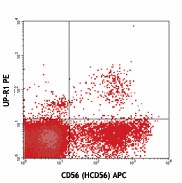
-

Human peripheral blood lymphocytes stained with UP-R1 PE and CD56 (HCD56) APC
| Cat # | Size | Price | Save |
|---|---|---|---|
| 341303 | 25 tests | ¥33,660 | |
| 341304 | 100 tests | ¥77,660 |
CD158 molecules, also known as KIRs (killer cell immunoglobulin-like receptors), are a family of transmembrane proteins with either two (KIR2D) or three (KIR3D) Ig-like extracellular domains. Some KIRs with long cytoplasmic domains contain ITIMs and posses inhibitory functions and others with short cytoplasmic region lack ITIM and have activation functions. 14 polymorphic KIR genes have been reported in humans. CD158f is a 60 kD glycoprotein with 2 Ig-like extracellular domains and long cytoplasmic domains. Its expression is highly polymorphic between individuals and mainly expressed on a subset of NK cells and a small population of T cells. HLA class I alleles are the ligands of CD158f.
Product DetailsProduct Details
- Verified Reactivity
- Human
- Antibody Type
- Monoclonal
- Host Species
- Mouse
- Immunogen
- Human KIR2DL5-Ig fusion protein
- Formulation
- Phosphate-buffered solution, pH 7.2, containing 0.09% sodium azide and BSA (origin USA)
- Preparation
- The antibody was purified by affinity chromatography, and conjugated with PE under optimal conditions.
- Concentration
- Lot-specific (to obtain lot-specific concentration and expiration, please enter the lot number in our Certificate of Analysis online tool.)
- Storage & Handling
- The antibody solution should be stored undiluted between 2°C and 8°C, and protected from prolonged exposure to light. Do not freeze.
- Application
-
FC - Quality tested
- Recommended Usage
-
Each lot of this antibody is quality control tested by immunofluorescent staining with flow cytometric analysis. For flow cytometric staining, the suggested use of this reagent is 5 µl per million cells in 100 µl staining volume or 5 µl per 100 µl of whole blood.
- Excitation Laser
-
Blue Laser (488 nm)
Green Laser (532 nm)/Yellow-Green Laser (561 nm)
-
Application References
(PubMed link indicates BioLegend citation) -
- Estefania E, et al. 2007. J. Immunol. 178:4402
- Product Citations
-
- RRID
-
AB_2130701 (BioLegend Cat. No. 341303)
AB_2130701 (BioLegend Cat. No. 341304)
Antigen Details
- Structure
- Contains two Ig-like extracellular domains, 60 kD
- Distribution
-
Subset of NK cells and a small subset of T cells, polymorphic expression
- Function
- Inhibits NK cell function, play a role in self-tolerance.
- Ligand/Receptor
- HLA alleles
- Cell Type
- NK cells, T cells
- Biology Area
- Immunology
- Molecular Family
- CD Molecules
- Antigen References
-
1. Zola H, et al. eds. 2007. Leukocyte and Stromal Cell Molecules:The CD Markers. Wiely-Liss A John Wiley & Sons Inc, Publication
2. Gonzalez A, et al. 2008. Tissue Antigens. 72:11 - Gene ID
- 57292 View all products for this Gene ID
- UniProt
- View information about CD158f on UniProt.org
Related Pages & Pathways
Pages
Related FAQs
- What type of PE do you use in your conjugates?
- We use R-PE in our conjugates.
Other Formats
View All CD158f Reagents Request Custom Conjugation| Description | Clone | Applications |
|---|---|---|
| PE anti-human CD158f (KIR2DL5) | UP-R1 | FC |
| TotalSeq™-A0600 anti-human CD158f (KIR2DL5) | UP-R1 | PG |
| TotalSeq™-C0600 anti-human CD158f (KIR2DL5) | UP-R1 | PG |
| Brilliant Violet 421™ anti-human CD158f (KIR2DL5) | UP-R1 | FC |
Customers Also Purchased
Compare Data Across All Formats
This data display is provided for general comparisons between formats.
Your actual data may vary due to variations in samples, target cells, instruments and their settings, staining conditions, and other factors.
If you need assistance with selecting the best format contact our expert technical support team.
-
PE anti-human CD158f (KIR2DL5)
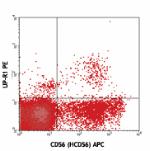
Human peripheral blood lymphocytes stained with UP-R1 PE and... -
TotalSeq™-A0600 anti-human CD158f (KIR2DL5)
-
TotalSeq™-C0600 anti-human CD158f (KIR2DL5)
-
Brilliant Violet 421™ anti-human CD158f (KIR2DL5)

Human peripheral blood lymphocytes were stained with anti-hu...










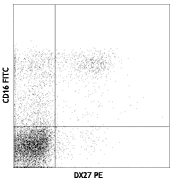
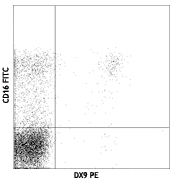
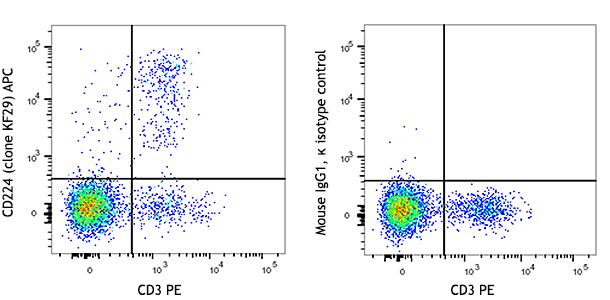
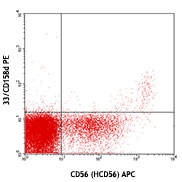



Follow Us